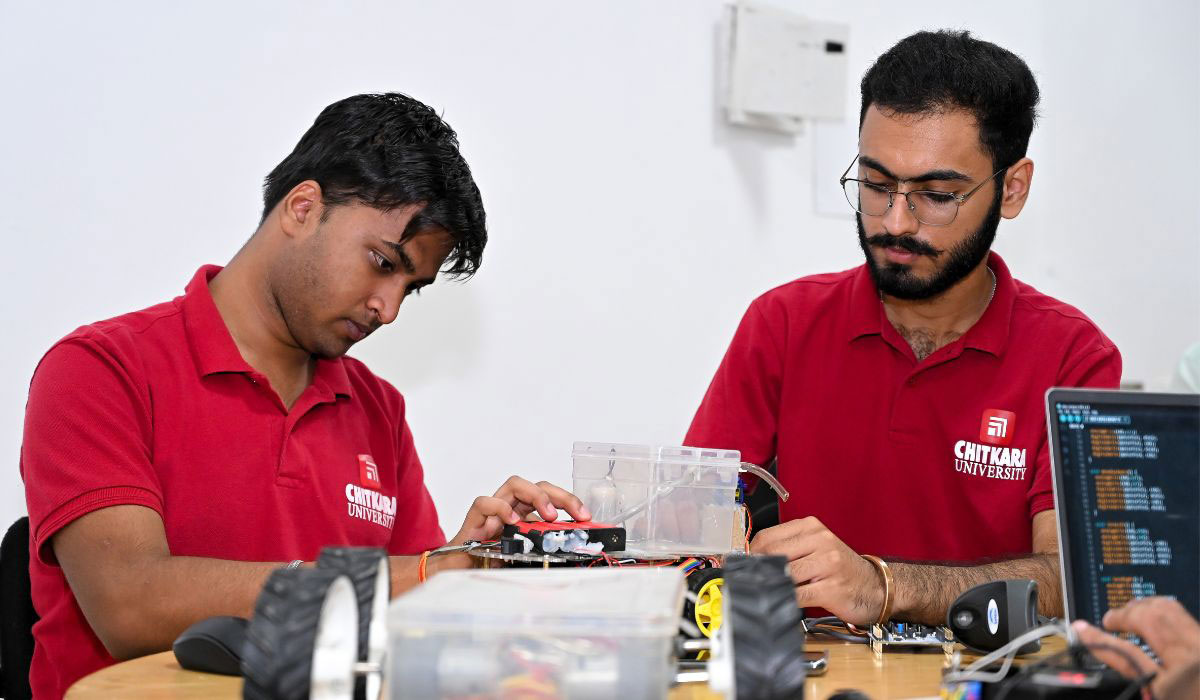Electronics and Communication Engineering is one of the fields that have become really important in this day and age, precisely because technology and communication play such an important part in our lives. Chitkara University has provided a cutting-edge curriculum in the Bachelor of Engineering in Electrical and Computer Engineering (ECE) in order to meet the evolving requirements of the technology sector. Some reasons why Chitkara University must be the first preference of all those who have their career interest in this ever-changing industry are given as follows:
This Bachelor of Engineering program in ECE under Chitkara University has been planned in the spirit of keeping pace with the latest innovations in electronics and communication engineering. All the aspects of this academic and practical area will be covered within the duration of four years. Some of the essential topics that come under the courses are embedded systems, wireless communication, satellite communication, and digital signal processing. With such a broad curriculum, graduates are assured that they will be prepared to address difficult engineering problems and to innovate in many different industries.
Specialization tracks are available in important fields such as Embedded Systems, VLSI, and Internet of Things (IoT) in this program. Students have the ability to adapt their education to coincide with their career goals and interests when they enroll in a program that has an emphasis on cutting-edge technologies such as Machine Learning, Deep Learning, and Industry 4.0. Because of this flexibility, students are able to focus their attention on subjects that they are particularly interested in, which provides them with specialized knowledge that is highly desired in the field of employment.
There is a strong emphasis placed on experiential learning at Chitkara University, which is accomplished through partnerships with prominent industry firms such as Nvidia, Texas Instruments, Micron, and Mentor Graphics. Because of these relationships, students have access to cutting-edge training equipment and software, which makes it possible for them to engage in hands-on learning that helps bridge the gap between the academic world and the business world. Not only does this technique ensure that students are adept in theoretical topics, but it also ensures that they are skilled in applying those concepts to obstacles that they will face in the real world.
A technologically advanced learning environment is supported by the university’s cutting-edge laboratories and resources, which are available to students. In order to prepare students for success in a variety of electronics specialties, whether in the manufacturing industry, commercial industries, or the public sector, they are provided with the opportunity to obtain practical experience in high-tech labs that are outfitted with some of the best electronics training equipment that is currently available.
Career Opportunities:
Electrical and Computer Engineering graduates in Chitkara University ECE program are in an absolutely enviable position to secure various career opportunities within wide ranging areas of burgeoning industrial fields. The course work is tailored in a way that students are fully skilled with skills and knowledge in working out job assignments where depth understanding in electrical systems along with computer science is demanded. These careers also offer career advancement avenues with the advancement of the technology. Here are a few of the key areas into which ECE graduates would look:
Software System Analyst: A software system analyst is responsible for the design and analysis of software systems to meet the needs of an organization. He checks the system requirements, checks the feasibility of projects, and assures that the system aligns with business processes. Software system analysts often communicate with various stakeholders to acquire requirements and transform them into functional specifications to bridge the gap between technical and non-technical teams.
Network Planning Engineer: As qualified professionals in the area of telecommunications, network planning engineers consider the already existing framework for networks and design further enhancements on how such networks will work. In addition to developing new technology, this can include improvements in expanding communications and bettering overall system performance. The expert role assures reliability and efficiency in all kinds of communications systems essential to everyday functioning.
Customer Service Engineer (CS Engineer): CS Engineers are dedicated to maintaining and enhancing customers’ satisfaction with a business’s products or services. They are responsible for providing technical assistance for problems, and troubleshooting sometimes involves working directly with a customer to resolve issues dealing with electrical or computer systems. This job combines both technology and customer relations skills that are very necessary for a company that aims to effectively service its clients.
Research and development software engineer: R&D engineer designs, tests, and deploys new applications in developing software that may advance things in telecommunications, consumer electronics, and automation, so pretty much central trying to be ahead in firms that want to have constant releases of new innovative products.
Chief Designer and Development Engineer: In general, they represent leadership roles wherein a manager is responsible for a given team within the process of designing and developing new electrical and electronic products or systems. These engineers will lead or spearhead projects from when they are conceptualized and up to the implementation and ensure that the designs submitted meet all specified requirements to satisfy industry-established standards. It is a function of bringing different members of a team toward a common goal while having all project deadlines met at the end.
Analog Applications Assistant Engineer This position deals with analog electronic systems. Support the development, test, and debug work associated with the development of analog devices so that they can operate optimally and reliably. The role involves much work with senior engineers to get hands-on experience of the principles of analog signal processing and circuit design.
Telecommunication Engineer: Telecommunications engineers deal with the process of transferring information through various kinds of communication systems, including satellite, fiber optic, and wireless networks. They manage designing, installation, and maintenance processes in telecommunication systems so that they are performed within optimum parameters and in conformity with regulatory requirements. The area of their expertise would be highly in demand considering the ever-increasing need for free-flowing communication in all spheres of life.
Diversified Industries Offering Employment
Employment after graduating in ECE is diverse and can be found across a wide spectrum of areas, including:
Consumer Electronics: Innovations in the designing and development of novel consumer devices, such as smartphones, home appliances, and wearable technology.
Telecommunications: Working with companies that operate communication services by improving connectivity with advanced network systems.
Information Technology: Software development, IT management, and cloud computing services.
Manufacturing Healthcare Equipment: Assisting with design and development, servicing of medical devices, diagnosis equipment, and telehealth technologies with principles of engineering into health innovations.
Automotive and Transportation: Innovation towards Safety, Navigation, and Automotive technologies.
Thus, in brief, a degree in Electrical and Computer Engineering from Chitkara University will arm the graduates with an extremely solid foundation and a range of skills to face challenging, competitive, and diverse job markets. With the rapid development of technology, vast scope still remains for growth and development in many areas; hence ECE stands as a brilliant choice for cutting-edge engineering careers.
Solid connections within the industry and placement opportunities
Excellent job placement options are made available to alumni of Chitkara University as a result of the university’s extensive networks with Fortune 500 organizations and well-known technology firms. Because the university places such a strong emphasis on providing students with higher-order thinking skills, problem-solving ability, and an entrepreneurial spirit, it ensures that these students will have an advantage over other candidates in the global employment market.
Also, read this blog post: Is Electronics and Communication Engineering in Demand? Unveiling the Truth
If you decide to pursue a degree in Electrical and Computer Engineering (ECE) at Chitkara University, you will be participating in a program that combines challenging academics with hands-on experience, insights into the industry, and cutting-edge technology. Not only is it a means of obtaining an education, but it also serves as a route to achieving leadership positions in the rapidly developing sector of electronics and communication engineering. This curriculum will put you on the way to a satisfying career, regardless of whether your objective is to develop ground-breaking solutions in developing technology domains, improve consumer electronics, or innovate in the field of telecommunications by enhancing consumer electronics.






